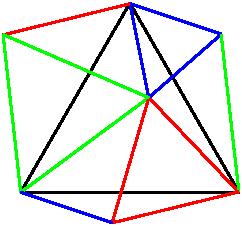Let $a, b, c$ be the side lengths of the triangle, and $x, y, z$ the distances from a point inside a triangle to the respective vertices. Then the numbers $x,y,z$ satisfy the equation $$\begin{vmatrix} 0 & 1 & 1 & 1 & 1\\ 1 & 0 & x^2 & y^2 & z^2\\ 1 & x^2 & 0 & c^2 & b^2\\ 1 & y^2 & c^2 & 0 & a^2\\ 1 & z^2 & b^2 & a^2 & 0 \end{vmatrix} = 0$$ This is the Cayley-Menger determinant, for pairwise distances between four points in $\mathbb{R}^3$ it is proportional to the square of the volume of the tetrahedron they span. The volume vanishes if and only if four points are coplanar.
EDIT: Richard Stanley mentioned in his comment that for an equilateral triangle with $a=b=c$ the above condition becomes $$ 3(x^4 + y^4 + z^4 + a^4) = (x^2 + y^2 + z^2 + a^2)^2, $$ which is symmetric not only in $x, y, z$ (as it obviously should be), but also with respect to all permutations of $a, x, y, z$ (which is unexpected). This can be proved by the picture below.

